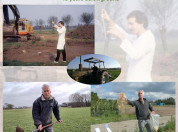Zoeken
Filteren op
Type
Labels
Dossiers
Thema's
Afdelingen
Taal
Active filters
42 zoekresultaten
Zoekresultaten
-
National Growth Fund finances Dutch Holomicrobiome Institute
The government of the Netherlands has allocated €200 million from the country’s National Growth Fund for a public-private consortium that will conduct research into 'microbiomes' and economically interesting applications thereof. In the consortium, NIOO is partnering with ten Dutch universities, five university-medical centres, four universities of applied sciences, many other knowledge organisations and together with dozens of small and large companies and societal organisations.
-
Nationaal Groeifonds financiert landelijk Holomicrobioom Instituut
Het Nederlandse kabinet heeft €200 miljoen uit het Nationaal Groeifonds toegekend aan een publiek-privaat consortium dat onderzoek gaat doen naar ‘microbiomen’ en economisch interessante toepassingen daarvan. De subsidie uit het Groeifonds, bovenop €150 miljoen die de tientallen consortiumdeelnemers zelf bijdragen, ondersteunt de komende tien jaar de activiteiten van een op te richten landelijk ‘Holomicrobioom Instituut’.
-
From Pioneer to Soil Prophet: 40 years belowground - Afscheidssymposium Wietse de Boer
Op donderdag 4 april 2024 nemen we afscheid van onze collega Prof. dr. Wietse de Boer (Afdeling Microbiële Ecologie bij het NIOO-KNAW en Wageningen University) met het Afscheidssymposium 'From Pioneer to Soil Prophet: 40 years belowground'.
-
From Pioneer to Soil Prophet: 40 years belowground - Farewell symposium Wietse de Boer
On Thursday April 4 we'll have the Farewell Symposium and reception for our long-time colleague Prof. Dr Wietse de Boer (Department of Microbial Ecology at NIOO and Wageningen University).
-
Suzanne McGowan appointed Professor of Aquatic Ecosystem Dynamics
Meet the new Special Professor of Aquatic Ecosystem Dynamics: Suzanne McGowan. As of 2024 she is appointed at Utrecht University. Her chair offers a unique combination between the university's faculties of Science and Geosciences. McGowan integrates this with her main affiliation as the Head of Aquatic Ecology at the Netherlands Institute of Ecology (NIOO-KNAW). As a professor, she aims to uncover how water ecosystems have been functioning, and how the major changes on our planet affect this.
-
“Waterecosystemen veranderen razendsnel”
Suzanne McGowan is benoemd tot bijzonder hoogleraar Aquatic Ecosystem Dynamics bij de Universiteit Utrecht. Zij gaat zich richten op de vraag hoe waterecosystemen werken, en hoe die onder invloed staan van de grote veranderingen die onze planeet doormaakt. McGowan blijft daarnaast verbonden aan het Nederlands Instituut voor Ecologie (NIOO-KNAW) als hoofd van de afdeling AquatischeEcologie. Als hoogleraar zal ze bruggen slaan tussen diverse onderzoeksgroepen.
-
Book presentation on Water farming
On Friday afternoon 29 September, a new book about Water farming will be presented at NIOO. NIOO scientists Ellen Weerman and Ellen van Donk are two of the editors, and you are very welcome to join. The presentation will be in Dutch.
-
Boekpresentatie Waterlandbouw
Op 29 september publiceert Stichting Biowetenschappen en Maatschappij het cahier Waterlandbouw – kansen en keerzijden van natte teelten. NIOO-onderzoekers Ellen Weerman en Ellen van Donk hebben zitting in de redactie en nodigen u van harte uit om erbij te zijn.
-
Landbouw en natuur: een zaak voor overheid, keten en boeren
We moeten meer rekening houden met natuur binnen het Nederlandse landbouwsysteem. Hier pleiten wij ervoor dat overheden hun rol oppakken én dat de keten verantwoordelijkheid neemt.
-
Follow-up funding for microbial fight against parasitic weed in Africa
Can micro-organisms in the soil help the fight against parasitic weeds in Africa? That question launched Promise six years ago. After promising initial results, the Bill & Melinda Gates Foundation has now awarded follow-up funding to the project.
